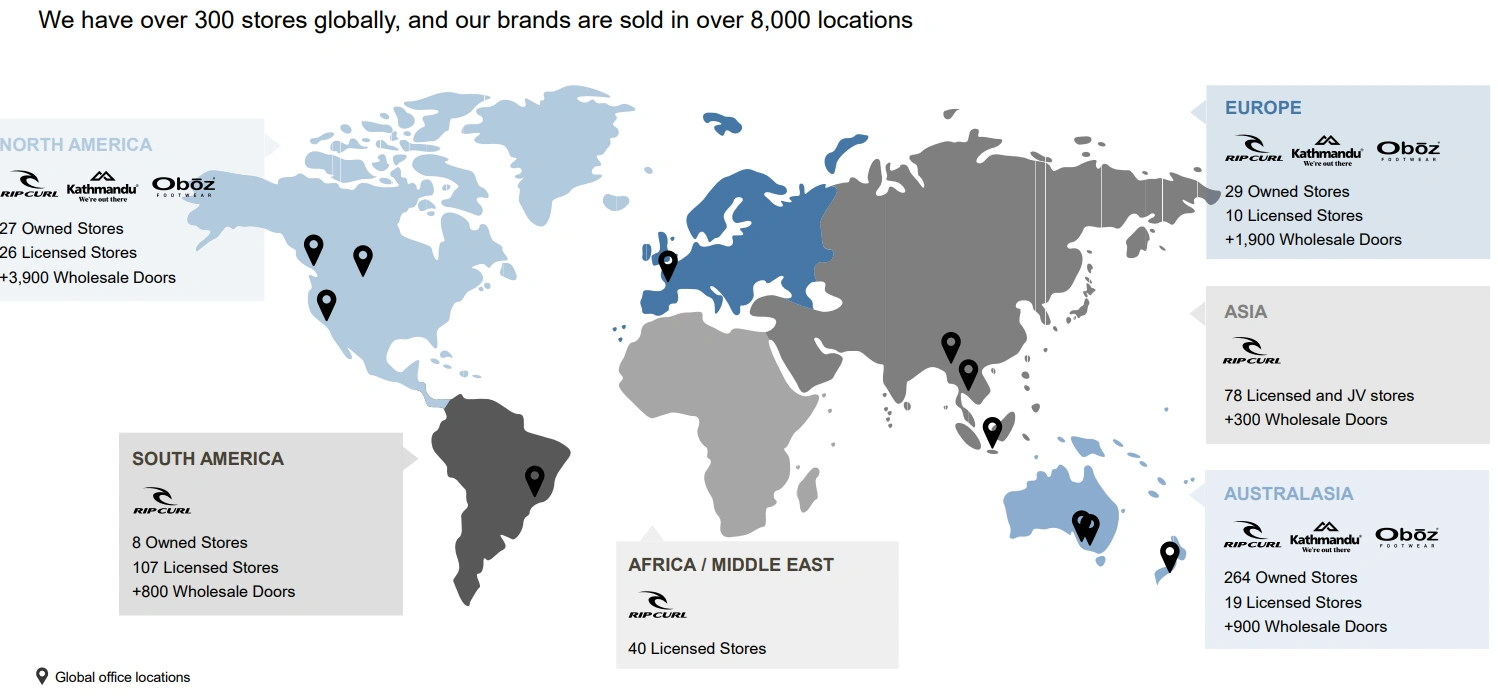KMD Brands (ASX:KMD), which owns iconic outdoor and sportswear brands Rip Curl, Kathmandu, and Oboz Footwear, has formally introduced an initiative (called the Next Level plan) to transform itself. It was announced at its 2025 Investor Day on 4 September. It is a worldwide project to realise the full potential of its brand portfolio and achieve profitable growth again in a sustainable way.
Transformation Strategy Overview
The “Next Level” plan targets a minimum $25 million cost reset. KMD Brands will achieve this through organisational restructuring and a thorough review of its store network. The strategy focuses on enhancing product innovation, speeding time-to-market, and improving design and style across its brands.
Store Network Review and Changes
KMD Brands operates more than 328 Company-owned stores globally. The transformation includes plans to close at least 21 underperforming stores within the Kathmandu and Rip Curl networks. Despite the closures, the Company plans to open new stores in key locations. This includes new Rip Curl outlets along the Mediterranean coasts of Italy, Spain, and France, as well as three new Kathmandu concept stores in Australia and New Zealand later this year.
 KMD’s global reach and diversification
KMD’s global reach and diversification
Leadership and Organisational Changes
The transformation plan also involves significant leadership changes. More than 10 senior executive roles have been altered in the past 18 months to strengthen the group’s core capabilities. KMD chairman David Kirk said, “We have deliberately made significant executive team changes to enhance the core capabilities of the group.” Chief executive Brent Scrimshaw reiterated the focus on the Company’s potential and growth opportunities, stating, “What I’ve been is clear: the potential of our brands is far greater than what we’re delivering today.”

Financial Performance and Market Context
KMD Brands has faced financial pressures in recent periods. The Company reported a $NZ20.7 million loss for the six months ending 31 January 2025 and a $NZ38.3 million loss in the previous year. Sales declined by 0.5% in the first 10 months of thee 2024/25 financial year. Warmer Australian weather reduced demand for insulated products such as Kathmandu’s puffer jackets, contributing to the downturn. The Company also amended financial covenants earlier this year concerning its $NZ70 million debt.
Strategic Focus on Innovation and Differentiation
Scrimshaw pointed out issues around product development within the group. He commented on the “insufficient iconic product and innovation cadence” and described the existing products as “a sea of sameness” with little differentiation. The reset plan addresses these challenges by refocusing efforts on unique product innovations and enhancing speed-to-market capabilities to better meet consumer expectations.
Also Read: Historic Robodebt Class Action Settlement Delivers Record Compensation for Australian Victims
Stock Market Reaction and Upcoming Results
The announcement saw KMD shares increase 4.6% to 23% in the morning of 4 September, although the shares are still down 39.5% for the year 2025. The Company will release its 12-month results for the period ending July 31 on September 24, providing additional information about the effects of this transformation plan.
Outlook for Growth and Profitability
KMD Brands aims for the “Next Level” transformation to drive both growth and profitability across its global operations. The strategy aligns the organisation behind a customer-centric growth agenda and the revitalisation of its core brands. This comprehensive approach targets efficient cost management alongside renewed product and retail network strategies.
Overall, the Next Level transformation plan by KMD Brands presents a disciplined effort to reposition the Company to be successful over the long term. KMD will realise the value within its portfolio by re-aligning its costs, optimising its store portfolio, reorganising its leadership and innovating its products to create value in its portfolio and reestablish profitability in a difficult retailing setting.
This programme is an important move towards regaining market confidence and enhancing the presence of its established brands globally. The Company has continued to focus on creating value for shareholders and customers as it adjusts to market conditions and consumer demand changes.





